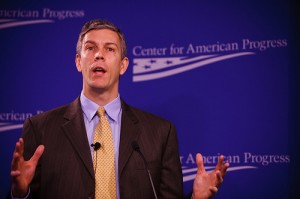
U.S. Secretary of Education Arne Duncan. Photo by Ralph Alswang
SAN FRANCISCO – Secretary of Education Arne Duncan acknowledged serious flaws in the standardized tests that currently drive American schools, telling an audience of education researchers on Tuesday that the tests are an inadequate gauge of student and teacher performance.
Speaking at the annual meeting of the American Educational Research Association, Duncan criticized “high-stakes testing where children’s lives or teachers’ careers are based on one test,” but he said that abandoning standardized testing was not the answer. He listed a series of misguided uses of standardized tests, mentioning a school in Florida that evaluated teachers in kindergarten through second grade based on how students performed in third and fourth grade, and a school in Memphis that evaluated art teachers based on student scores in math and English.
“The solution to mediocre tests is not to abandon assessment,” Duncan said. “Instead we’re supporting much better assessment.” Duncan called for “assessment 2.0,” which would provide timely evaluation of student performance in areas beyond reading and math, including science, advanced class work, and career readiness.
His remarks surprised the somewhat contentious audience of researchers, about a dozen of whom carried signs that read “Not in my name” or “Erase to the top” – a reference to cheating on standardized tests – to protest Duncan’s appearance at the conference and the Obama administration’s Race to the Top education program, the competitive grants initiative for education innovation. California has received just $50 million from the $4.3 billion fund.
“Sir, Race to the Top is no less than No Child Left Behind on steroids,” said an audience member in a question-and-answer session after the secretary’s talk.
Duncan had blamed the current testing ills on former President Bush’s No Child Left Behind program, but the audience member said the Race to the Top program had the same pitfalls. “The superintendents I speak to, the people I speak to, say this is a high stakes testing regime that is suffocating them,” said the educator.
Duncan acknowledged the speaker’s concerns, but he said that teachers wanted the meaningful assessment tools that he hoped would result from a Race to the Top competition to improve assessment.
Duncan also acknowledged that the introduction of the new Common Core standards, as well as new assessment tools, are going to create “a couple of choppy years” for schools. He said he had been talking at length with educators, including Randi Weingarten, president of the American Federation of Teachers, about how to help schools navigate the change. “We’re trying to be very, very thoughtful about it. … When we get to the other side, I think the country will be in a radically better place, but we have to get there.”
When an audience member asked if Duncan would consider a moratorium on standardized testing until teachers get up to speed on the Common Core and the assessment tools prove to be effective, Duncan said, “We understand this is a difficult tough time of transition. We’re spending a huge amount of time listening to ideas about how to do it.”
Duncan returned several times to the theme that the current testing system isn’t working. “Schools today give a lot of tests, sometimes too many,” he said. “It’s a serious problem that students in this formative time aren’t getting the support they need through authentic assessment.”
He added, “It’s heartbreaking to hear students identify themselves as ‘below basic’ or ‘I’m a one.’ Not enough is being done to track student growth with high-quality formative assessment.” And he said standardized tests “certainly don’t measure qualities of great teaching, the ability to give individual instruction, to collaborate, to inspire a lifelong love of learning.”
Duncan is making several speeches in a tour around the Bay Area this week. Earlier Tuesday, he visited the Cross Cultural Family Center child care program in San Francisco to talk about early childhood learning. He is scheduled to appear Wednesday with Rep. Mike Honda, D-San Jose, at Fremont High School in Sunnyvale to launch a new effort to improve early education, before going on a series of site visits. And Thursday, Duncan will speak at the Education Writers Association national conference at Stanford.
To get more reports like this one, click here to sign up for EdSource’s no-cost daily email on latest developments in education.